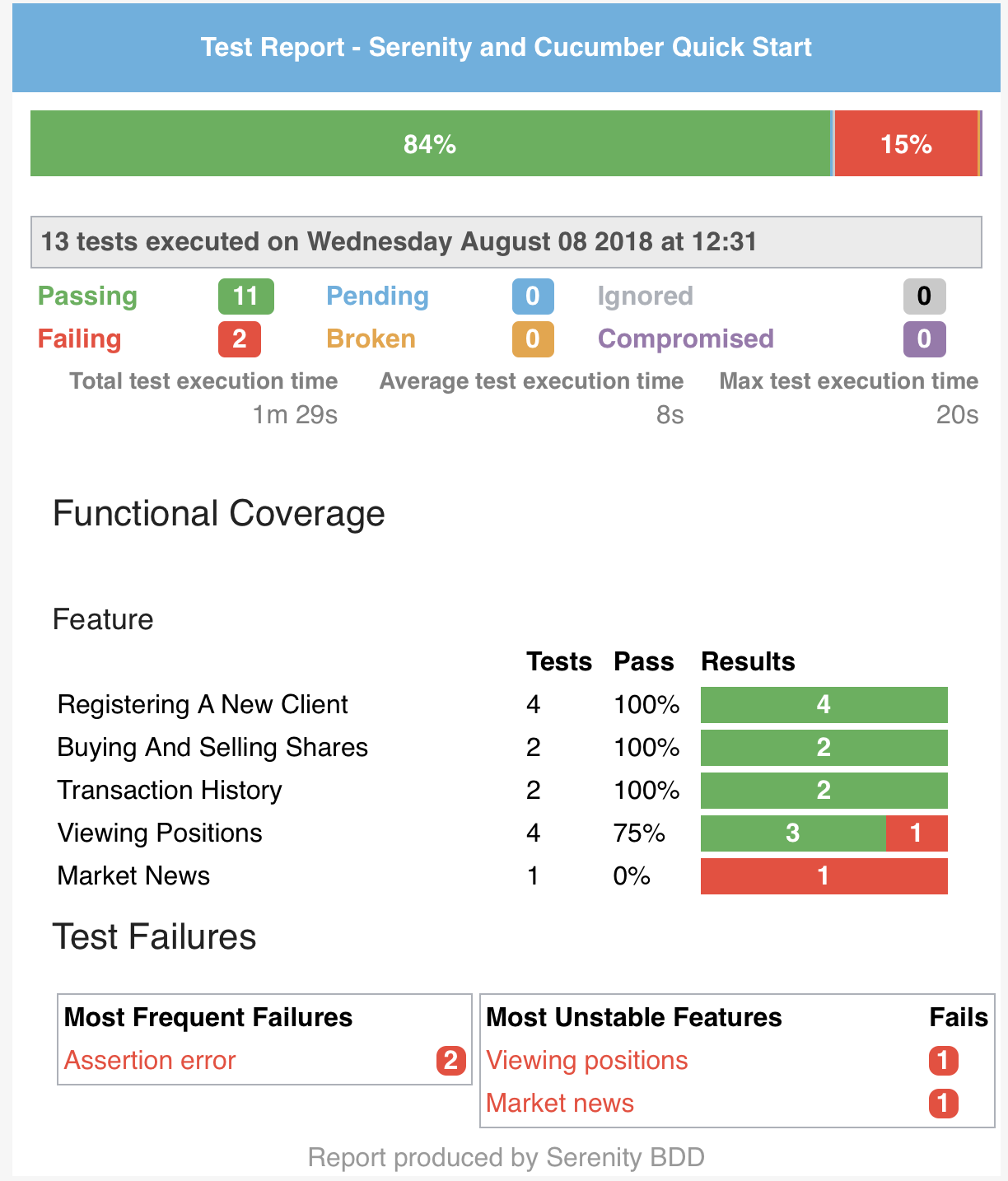As an automation tester, I want to generate single page HTML report. So, I can send the report to other members easily. To do that, I will use Serenity Report to generate the single page report.
Prerequisite
Asssumtion that we will using Junit 5 in our project. So we will setup to project that can execute the test cases with command line.
In the pom.xml we need some dependencies:
//pom.xml file
<properties>
...
<serenity.version>3.2.1</serenity.version>
</properties>
...
</dependencies>
...
<dependency>
<groupId>net.serenity-bdd</groupId>
<artifactId>serenity-core</artifactId>
<version>${serenity.version}</version>
</dependency>
<dependency>
<groupId>io.github.fabianlinz</groupId>
<artifactId>serenity-junit5</artifactId>
<version>1.2.1</version>
</dependency>
</dependencies>
...
After adding dependencies into pom file, we can use it to run the test cases
//WhenCompareTwoObject.java file
@SerenityTest
public class WhenCompareTwoObject {
User actualUser;
User expectedUser;
@Test
public void should_be_able_to_compare_two_equal_project(){
actualUser = new User("dani",22,true,12.22);
expectedUser = new User("dani",22,true,12.22);
Assertions.assertThat(actualUser).usingRecursiveComparison()
.isEqualTo(expectedUser);
}
}
There are two things we have to use correctly are:
- Using annotation @SerenityTest for the test class
- Using annotation @Test of
Junit5fo the test scenario instead ofJunit4
The main purpuse of these precondition steps is that we can run test cases with maven commonline, So we can using following commonline to verify that the project can be executed with maven’s commonline.
mvn clean install
//or
mvn clean verify
Generate HTML
After precondition steps is done, We need to add some plugins into pom.xml to make the single page HTML report is generated automatically.
<build>
<plugins>
...
<plugin>
<groupId>org.apache.maven.plugins</groupId>
<artifactId>maven-surefire-plugin</artifactId>
<version>3.0.0-M5</version>
<configuration>
<skip>true</skip>
</configuration>
</plugin>
<plugin>
<artifactId>maven-failsafe-plugin</artifactId>
<version>3.0.0-M5</version>
<configuration>
<includes>
<include>**/*.java</include>
</includes>
<excludes>
<exclude>**/*WithFailures.java</exclude>
</excludes>
</configuration>
<executions>
<execution>
<goals>
<goal>integration-test</goal>
<goal>verify</goal>
</goals>
</execution>
</executions>
</plugin>
<plugin>
<groupId>net.serenity-bdd.maven.plugins</groupId>
<artifactId>serenity-maven-plugin</artifactId>
<version>${serenity.version}</version>
<dependencies>
<dependency>
<groupId>net.serenity-bdd</groupId>
<artifactId>serenity-single-page-report</artifactId>
<version>${serenity.version}</version>
</dependency>
<dependency>
<groupId>net.serenity-bdd</groupId>
<artifactId>serenity-navigator-report</artifactId>
<version>${serenity.version}</version>
</dependency>
</dependencies>
<configuration>
<tags>${tags}</tags>
<reports>single-page-html,navigator</reports>
</configuration>
<executions>
<execution>
<id>serenity-reports</id>
<phase>post-integration-test</phase>
<goals>
<goal>aggregate</goal>
</goals>
</execution>
</executions>
</plugin>
</plugins>
</build>
Fillaly, we can generate the single page HML report after execute tests with commonline
mvn clean install
\\or
mvn clean verify

 How to compare two object with AssertJ
How to compare two object with AssertJ